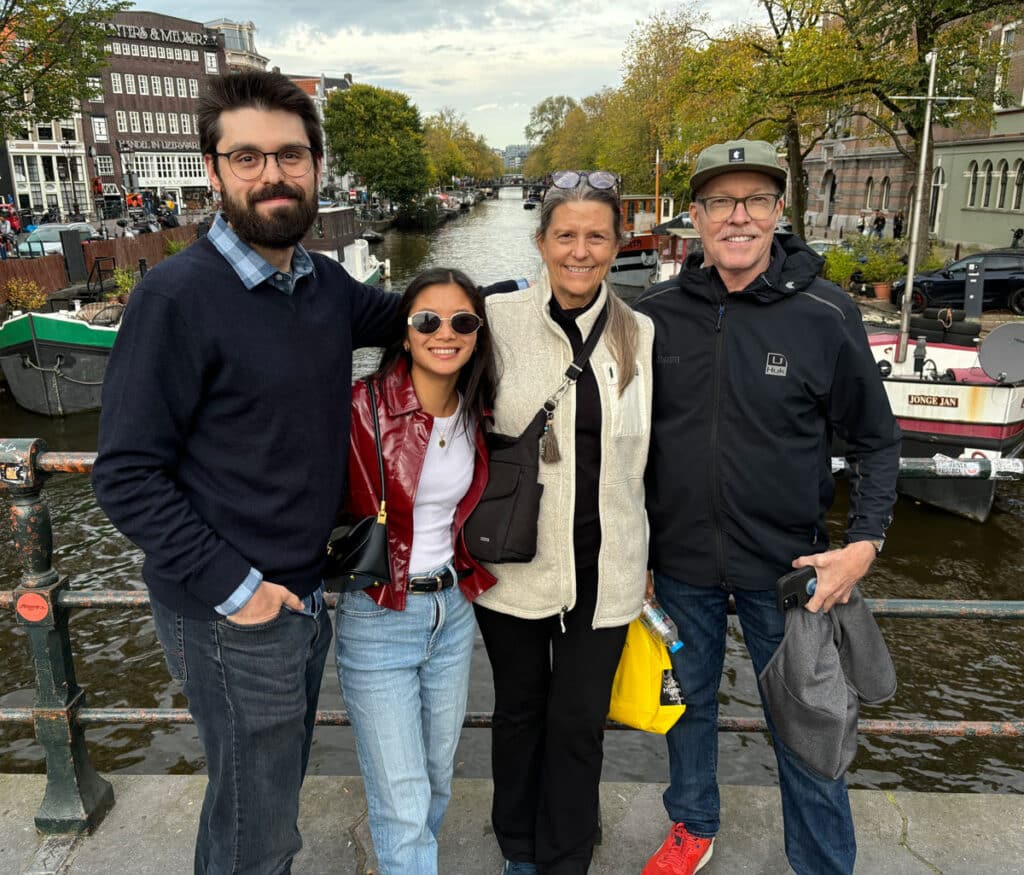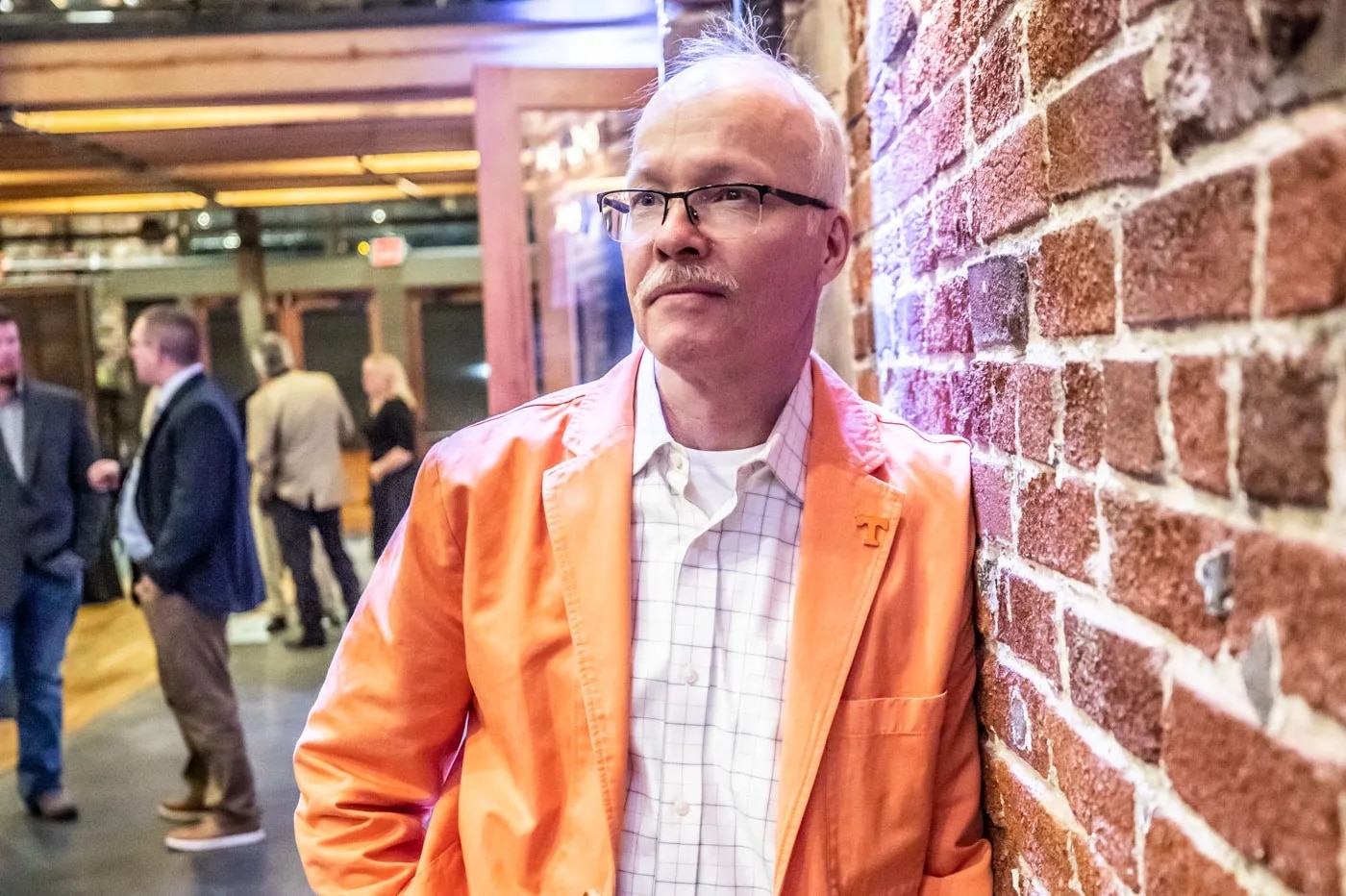There’s a lot Jim Sexton (’81) has recognized in hindsight about his many formative experiences at the University of Tennessee, Knoxville—but once he recognizes the impact, he turns around and acts on it.
When it occurred to him that working as a photographer for the yearbook and The Daily Beacon helped shape his career as a content creator, he gave to the Sellers Daily Beacon Endowment to support the student-led campus newspaper.
When he reflected on how John Ward—the long-running “Voice of the Vols” broadcaster—mentored him and shaped the trajectory of his life and career, he wrote a piece memorializing his relationship with Ward that will run soon in the UT Alumni Foundation’s newsletter The Volunteer. He has carried that mentorship with him and emulated it when he was in positions of management, particularly during his final journalistic endeavor as editor of Bassmaster.com.
“In the latter part of my career, the last ten years or so, my favorite thing was bringing in young people and helping them gain confidence and learn skills and grow. My technique was pretty simple: I would bring them in and throw them into it,” Sexton said with a chuckle. “I worked really hard on recognizing people and pointing out where they did great; that was my favorite part of being a website editor.”
Growing up a Vol
Sexton describes himself as an unambitious high schooler who grew up in Knoxville without any clue what he wanted to do upon graduating. UT was the obvious option so that’s where he headed for his higher education, but his major was not so obvious.
“For two years I just went to school and took the general classes. For a short time, I became a geology major, and then had to do science and math. I thought physics and all was cool, but I was having a hard time doing it,” he said.
His path to declaring a major in journalism started when he took a job running tapes of the Vol Network’s Johnny Majors Show across Tennessee to Memphis, Nashville, and Jackson. That job connected him with John Ward, who threw Sexton into working with him during basketball games. It was the young student’s task to write down everything that happened during the game, along with time stamps, so the broadcaster could reference Sexton’s notes during his half-time broadcast.
“That was an amazing learning experience that honestly I didn’t really appreciate until years later,” he said.
Besides watching Ward in action during games, Sexton also learned about the announcer’s commitment to conducting in-depth research about players and coaches prior to the games. Ward had a law degree and approached his research with the eye of an attorney preparing for court.
“He would have pages and pages of notes that prepped him for the game, and it was colorful details about players and coaches so that he could weave them into the broadcast. That was cool to see in action and that’s how I worked for years and years and years—looking for the color in whatever you’re doing, whatever you’re writing about, managing, or photographing,” he said.
After his sophomore year, Sexton went to work at a tackle shop in Yellowstone National Park. He took with him a manual 35mm camera and took photos of the park during his time there, which he brought back to UT with him to show the staff of the UT yearbook and The Daily Beacon.
“Boom, I was a photographer for the yearbook and The Beacon. I was much better at doing the actual work than I was at classes. But at that point, I really started caring about the academics,” he said.
Working for the newspaper and yearbook was exactly how he liked to operate—with little supervision and an opportunity to take risks and fail.
“You could come up with your own way of figuring things out and whatever problem you were faced with, you found a solution somehow. That was a wonderful experience, and that, too, in hindsight really set me up nicely for a career in media,” Sexton said.
Life after UT
Sexton sought out photographer jobs after he graduated, but those were few and far between. He settled for a job giving science demonstrations to junior high and high schoolers in Indiana and New York on behalf of the Oak Ridge Associated Universities before taking a job in corporate communications for Consumer Powers in Michigan.
Once again, Sexton found himself with little supervision and the opportunity to be creative as he handled the employee newsletter for the company. He dug into the odd and interesting, including stories about a fellow employee who dated Madonna’s mother in high school and a guy who appeared in a Bud Light commercial.
“I just found the weird stories and people loved it,” he said.

Three issues in and he was moved to headquarters to start creating bill inserts for customer communications. But it wasn’t long before he wanted to come back to Rocky Top, so he “begged and pleaded” his way into the Knoxville-based company Whittle Communications. He spent several years there and worked his way up to editor-in-chief when the company closed its doors.
He moved to Washington, DC, and started covering lifestyle news for USA Weekend, a Sunday magazine inserted into Gannett newspapers. Once again, Knoxville called him back home and he landed a job at HGTV in 1998.
This became one of the most exciting eras of his career as the internet was picking up in popularity. Because Sexton had some experience with the internet, he was moved into the position of editor of the HGTV website and magazine—the latter of which quickly became defunct as the website started making massive audience gains.
“Over the course of nine years we built it into something that had five million unique visitors a month. It was one of those rare moments in my career where everything you did went right, the traffic kept growing,” he said, noting the HGTV television network was in about 10 million homes when he arrived, and grew to more than 100 million homes by the time he left.
Sexton left for Birmingham, Alabama, to work at Time, Inc. to manage their lifestyle websites including SouthenLiving.com, CookingLight.com, and Sunset.com, to name a few. But three years into that job the workforce was cut in half, and he was out of a position. This is where his career took another interesting turn.
The CEO of Time, Inc. retired and bought the fishing organization Bassmaster from ESPN and moved its headquarters from Orlando, Florida, to Birmingham. Sexton was asked to run the website, Bassmaster.com.
“I really went back to the days of covering UT sports. Bass fishing tournaments were a big deal for this organization, and I started covering tournaments all over the country, and worked to turn that website into a revenue producing vehicle,” he said.
While his time at the tackle shop in Yellowstone gave him some fishing experience, it was nowhere near the level of expertise and intensity that those participating in high-level tournaments approached the sport. So, lacking the technical background, Sexton did what he knew always worked: he found the color.
“I went into that job remarkably over-confident and was quickly disabused of that notion. The learning is fun; when you’re in journalism, you like learning about new topics, that’s what has been fun for me. When I wrote stories for Bassmaster, they were people stories. And I found tons of interesting stories among the competitors and the audience,” he said.
As for what he’s been up to since retiring from Bassmaster.com last year, Sexton admitted that he has “failed at retirement.” He currently works a handful of hours weekly at the outdoor gear store REI running the register—a job he’s found pleasantly challenging and fun.
Ever a content creator, Sexton also mentioned he’s slowly working on a writing project that he joked may make its debut in a decade or so, though the topic is still under wraps.
A homecoming
While Sexton has been long settled in Birmingham, he treks to Knoxville every few months to visit his parents and two sisters who still live here. While he’s at it, he’ll often catch a game, as is the case with this year’s homecoming game against Mississippi State University.
“I’m semi-obsessed,” Sexton said of his Vols fandom.
Despite the obsession, he kept his UT orange gear tucked away upon moving to Birmingham, located near UT’s rival, the University of Alabama. But it wasn’t long before he realized he would not, in fact, be assaulted if he flew his Power T flag proudly (if not literally, metaphorically). Now, he doesn’t hesitate to wear his UT orange “Daddy” hat out and about in Birmingham, such as when working as a poll worker on Election Day just to jokingly taunt his Alabama fan friends.
This trip back home and to UT will include a special visit with The Daily Beacon staff who benefit from his contribution to the endowment that helps the newspaper keep running. Sexton is excited to see what the students are doing and how The Beacon has changed since his time there.
He said the hands-on learning opportunities at the College of Communication and Information remind him of his time spent with Ward, and that he believes it’s the best way for students to learn. In particular, he said it is important for students to get the chance to work in a safe environment where they can make an attempt and fail miserably at it.
“For me, that was huge, huge, huge, to what I ended up doing. It gave me some joy and some confidence and the ability to work on the fly,” he said. “I think the hands-on experience is everything in media-related fields because you can do all the academics in the world and be really sharp and learn writing and learn broadcasting techniques and learn digital publishing and metrics and all those things, but I think when you actually do it and do it where you can fail, that’s when you learn.”

